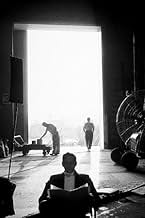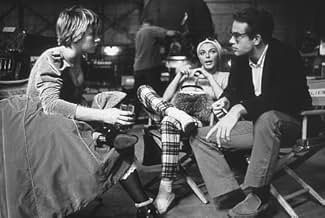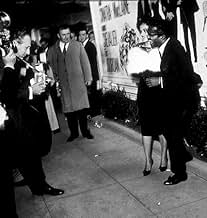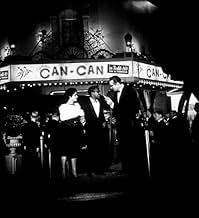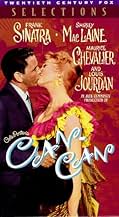Can-Can
- 1960
- Tous publics
- 2h 11min
NOTE IMDb
6,3/10
2,6 k
MA NOTE
Ajouter une intrigue dans votre langueIn 1896 Paris, a female nightclub proprietor fights against the forces of public morality for the right to feature her performers doing the risqué dance, the Can-Can.In 1896 Paris, a female nightclub proprietor fights against the forces of public morality for the right to feature her performers doing the risqué dance, the Can-Can.In 1896 Paris, a female nightclub proprietor fights against the forces of public morality for the right to feature her performers doing the risqué dance, the Can-Can.
- Nommé pour 2 Oscars
- 5 victoires et 7 nominations au total
Frank Baker
- Party Guest
- (non crédité)
Benjie Bancroft
- Club Patron
- (non crédité)
Herman Belmonte
- Waiter
- (non crédité)
Shirley Blackwell
- Townsfolk
- (non crédité)
Eugene Borden
- Police Officer Chevrolet
- (non crédité)
Buddy Bryan
- Dancer
- (non crédité)
Carole Bryan
- Gigi
- (non crédité)
Histoire
Le saviez-vous
- AnecdotesIt is explained in the film that the can-can was considered a lewd and lascivious dance (in reality often performed without panties).
- GaffesAbout 34 minutes in, when Philipe tries to close the window in Simone's boudoir, the whole wall shakes as he struggles with the window, indicating that it is a set wall and not a real building.
- Citations
François Durnais: You look like a broken umbrella.
- Crédits fousOpening credits prologue: Montmartre-1896
- ConnexionsFeatured in 20th Century-Fox: The First 50 Years (1997)
- Bandes originalesI Love Paris
(uncredited)
Music by Cole Porter
Lyrics by Cole Porter
Sung by chorus over the beginning and end credits
Commentaire à la une
'Can-Can' from personal opinion is one of Cole Porter's best later musicals, and there was so much talent involved in this film. It's just sad that something that should have sparkled like diamonds fell as flat as over-egged soufflé despite some very great things.
There's more to the problem than it being a butchered treatment of the Broadway hit, including a mangled re-written story with an additional character to cater Frank Sinatra, omitted songs and changes to lyrics. Pretty much all of the problems with 'Can-Can' are to do with how it fared on its own terms, which is while nowhere near one of the duds in musicals it's one of the classics either, if anything a missed opportunity.
Despite how this all sounds there is a good amount to like about 'Can-Can'. The film is visually stunning, opulently produced and photographed with spectacular gorgeousness. Porter's music and songs, even with how they're treated (most inexplicable being the lyric liberties in the title song, the original ones are brilliant and part of what makes 'Can-Can' one of Porter's better later musicals), are still superb. Especially the very touching "It's All Right With Me", sung (or crooned) beautifully by Sinatra.
Parts of the script has wit and charm, especially with Maurice Chevalier. Chevalier and Louis Jourdan give the film's two best performances, the former performing with a humorous twinkle and effortless charm and the latter having an urbane likability. Juliet Prowse also proves herself to be a wonderful dancer, and the choreography and musical numbers are really where 'Can-Can' really picks up in the interest value.
Yet, 'Can-Can', despite the music, Chevalier and Jourdan and the production values, never makes one properly feel like they've been transported to late 19th century Paris. Part of it is to do with the mostly anachronistic and talky script (especially in the courtroom parts that really dragged the film down pace-wise), and a larger part is do with the miscasting of the two leading roles. There is no denying that Sinatra sings beautifully with impeccable phrasing and breath control, but he is too contemporary and completely fails to bring personality, let alone any endearing traits, to a total sleazebag of a character. Shirley MacLaine is also too American, annoyingly shrill and doesn't look like her heart was completely in it.
As a result of the numerous changes, despite some moments, the story suffers consequently, the material needed more wit, emotion and life than what the film provides. Sluggish pacing in the non-musical moments and a rather too overlong length doesn't help. It's indifferently directed, the "Garden of Eden" sequence despite great dancing and choreography is overblown and goes on for far too long and the ending, with Simone's decision completely ringing false, feels like a cheat.
On the whole, some definite great things but considering the source material and talent 'Can-Can' should have sparkled so much more. 5/10 Bethany Cox
There's more to the problem than it being a butchered treatment of the Broadway hit, including a mangled re-written story with an additional character to cater Frank Sinatra, omitted songs and changes to lyrics. Pretty much all of the problems with 'Can-Can' are to do with how it fared on its own terms, which is while nowhere near one of the duds in musicals it's one of the classics either, if anything a missed opportunity.
Despite how this all sounds there is a good amount to like about 'Can-Can'. The film is visually stunning, opulently produced and photographed with spectacular gorgeousness. Porter's music and songs, even with how they're treated (most inexplicable being the lyric liberties in the title song, the original ones are brilliant and part of what makes 'Can-Can' one of Porter's better later musicals), are still superb. Especially the very touching "It's All Right With Me", sung (or crooned) beautifully by Sinatra.
Parts of the script has wit and charm, especially with Maurice Chevalier. Chevalier and Louis Jourdan give the film's two best performances, the former performing with a humorous twinkle and effortless charm and the latter having an urbane likability. Juliet Prowse also proves herself to be a wonderful dancer, and the choreography and musical numbers are really where 'Can-Can' really picks up in the interest value.
Yet, 'Can-Can', despite the music, Chevalier and Jourdan and the production values, never makes one properly feel like they've been transported to late 19th century Paris. Part of it is to do with the mostly anachronistic and talky script (especially in the courtroom parts that really dragged the film down pace-wise), and a larger part is do with the miscasting of the two leading roles. There is no denying that Sinatra sings beautifully with impeccable phrasing and breath control, but he is too contemporary and completely fails to bring personality, let alone any endearing traits, to a total sleazebag of a character. Shirley MacLaine is also too American, annoyingly shrill and doesn't look like her heart was completely in it.
As a result of the numerous changes, despite some moments, the story suffers consequently, the material needed more wit, emotion and life than what the film provides. Sluggish pacing in the non-musical moments and a rather too overlong length doesn't help. It's indifferently directed, the "Garden of Eden" sequence despite great dancing and choreography is overblown and goes on for far too long and the ending, with Simone's decision completely ringing false, feels like a cheat.
On the whole, some definite great things but considering the source material and talent 'Can-Can' should have sparkled so much more. 5/10 Bethany Cox
- TheLittleSongbird
- 17 sept. 2016
- Permalien
Meilleurs choix
Connectez-vous pour évaluer et suivre la liste de favoris afin de recevoir des recommandations personnalisées
- How long is Can-Can?Alimenté par Alexa
Détails
- Date de sortie
- Pays d’origine
- Site officiel
- Langues
- Aussi connu sous le nom de
- Jack Cummings' Production of Cole Porter's Can-Can
- Lieux de tournage
- Paris, France(stock footage of the evening barge sequences)
- Société de production
- Voir plus de crédits d'entreprise sur IMDbPro
Box-office
- Budget
- 6 000 000 $US (estimé)
- Durée2 heures 11 minutes
- Rapport de forme
- 2.20 : 1
Contribuer à cette page
Suggérer une modification ou ajouter du contenu manquant





